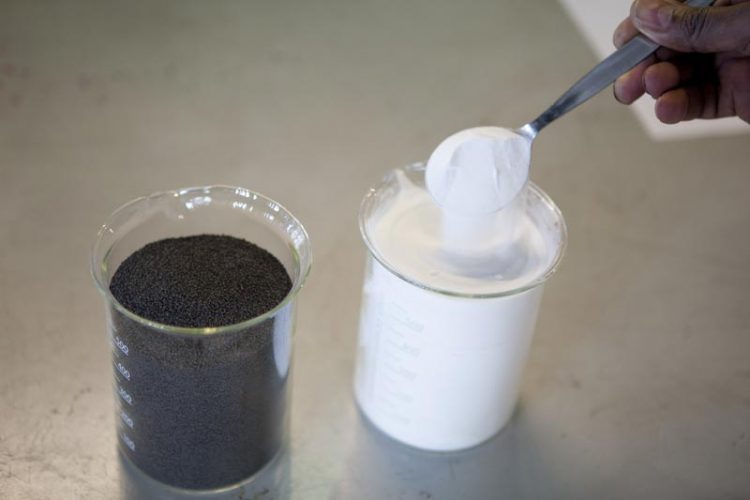Researchers convert carbon dioxide into a valuable resource

Slag and Precipitated Calcium Carbonate (PCC)
The product, Precipitated Calcium Carbonate (PCC), is used in e.g. plastics, papers, rubbers and paints. The innovative plant represents the next stage prior commercialization of a new process that consumes CO2 in order to convert a low-value by-product into a highly valuable resource for industry.
The potential economic and environmental benefits of this new technology are significant. “We are turning the industrial solid by-product from steel-manufacturing into a product which is 50 times more valuable,” says Arshe Said, a postgraduate researcher at Aalto University. “Also, this process actually consumes CO2 and acts as a CO2 sink which benefits the environment greatly.”
Current methods of PCC production require burning large amounts of limestone. “The conventional method involves large mining activities and has high CO2 emissions,” points out Sanni Eloneva, D.Sc. (Tech).
Carbon intensive manufacturing industries are coming under increasing pressure from bodies such as the EU to reduce greenhouse gas emissions. “We believe this pilot plant will help to efforts by these industries to conform with government imposed emissions and waste targets,” explains Professor Mika Järvinen.
In 2010, 13% of the total steel slag produced in Europe (16 Mt) went to the landfill. “In theory, if all the calcium in this steel slag could be recovered, approximately 13 Mt PCC/year could be produced, simultaneously sequestering nearly 6 Mt CO2/year,” Järvinen continues.
The highly promising new technology also has other potential advantages. “We are currently investigating the possibility of extracting other valuable materials from the slag after the extraction of calcium”, says Said.
The pilot PCC plant is now running in Otaniemi campus of Aalto University. The method used in the pilot is based on the patent owned by Aalto University Foundation together with Åbo Akademi and Rautaruukki Oyj (now part of SSAB).
For More Information
Aalto University
Arshe Said
Postgraduate researcher
arshe.said@aalto.fi
+358 50 571 8886
http://people.aalto.fi/index.html?language=english#arshe_said
Sanni Eloneva
Post-doc researcher
sanni.eloneva@aalto.fi
+358 50 448 9666
Mika Järvinen
Associate Professor
mika.jarvinen@aalto.fi
+358 50 414 2593
http://people.aalto.fi/index.html?language=english#mika_jarvinen
Pilot plant video: http://youtube.com/watch?v=HqkeYyWGHO8
Press photos: http://materialbank.aalto.fi:80/public/40229e15c8C7.aspx
Researchers' article on the pilot plant: http://viewer.zmags.com/publication/649b3363#/649b3363/74, Project Magazine UK
Researchers' article on the technology: http://www.sciencedirect.com/science/article/pii/S0306261912009336
Sanni Eloneva´s Doctoral dissertation (2010): Reduction of CO2 emissions by mineral carbonation: steelmaking slags as raw material with a pure calcium carbonate end product, http://lib.tkk.fi/Diss/2010/isbn9789526034577/
The development work has been funded by Academy of Finland, Finnish Funding Agency for Innovation (Tekes) together with many companies, CLEEN Oy´s Carbon Capture and Storage research program (CCSP), and Aalto Center for Entrepreneuship (ACE).
Media Contact
All latest news from the category: Process Engineering
This special field revolves around processes for modifying material properties (milling, cooling), composition (filtration, distillation) and type (oxidation, hydration).
Valuable information is available on a broad range of technologies including material separation, laser processes, measuring techniques and robot engineering in addition to testing methods and coating and materials analysis processes.
Newest articles

Why getting in touch with our ‘gerbil brain’ could help machines listen better
Macquarie University researchers have debunked a 75-year-old theory about how humans determine where sounds are coming from, and it could unlock the secret to creating a next generation of more…

Attosecond core-level spectroscopy reveals real-time molecular dynamics
Chemical reactions are complex mechanisms. Many different dynamical processes are involved, affecting both the electrons and the nucleus of the present atoms. Very often the strongly coupled electron and nuclear…

Free-forming organelles help plants adapt to climate change
Scientists uncover how plants “see” shades of light, temperature. Plants’ ability to sense light and temperature, and their ability to adapt to climate change, hinges on free-forming structures in their…





















